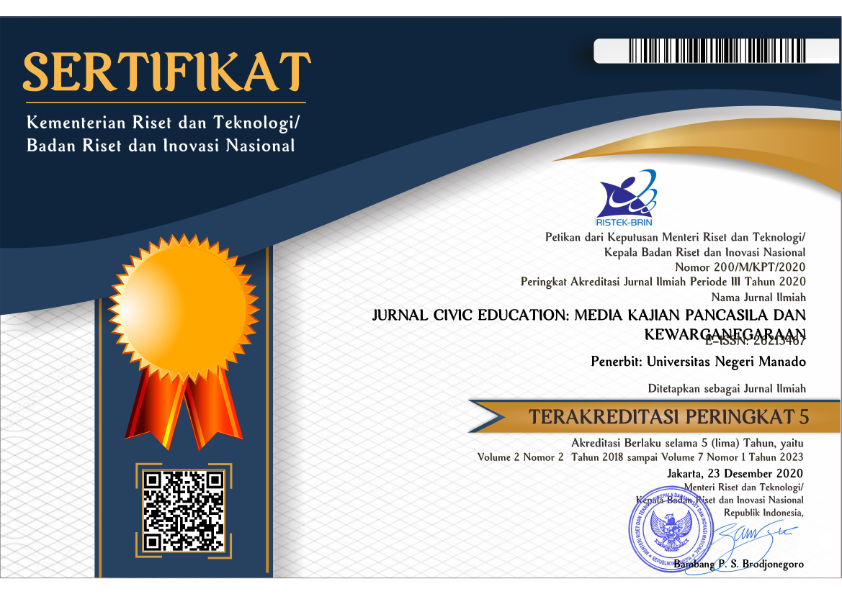Relasi Gender Pada Perkawinan Antar Etnis: Studi Kasus Perempuan Minangkabau
 ), Susi Fitria Dewi(2),
), Susi Fitria Dewi(2),
(1) Universitas Negeri Padang
(2) Pendidikan Pancasila dan Kewarganegaraan, Universitas Negeri Padang
 Corresponding Author
Corresponding Author
Abstract
Gender relations on inter-ethnic marriage (Minangkabau Women's Case Study). Inter-ethnic marriage in Indonesia is a strategy in strengthening the integration of the nation in the modern era. Minangkabau as one of the big ethnicities is included on thissocial facts. One of the driving factors is merantau tradition. The culture of merantau allows Minangkabau people then interacts with various ethnicities and nations. Meanwhile, women in Minangkabau have a special role because they adhere to the matrilineal kinship system. They can carry out marriage with ethnicity and other tribes outside Minangkabau and maintain their traces at the same time. This cultural factor strengthens marriage patterns and affects the family formation process. The attitude of women in inter-ethnic marriage relations also plays a role in solving problems in the family. This paper discusses how Minangkabau women's strategy in inter-ethnic marriage relations in Indonesia? What factors affect Minangkabau women in choosing a partner who comes from outside the tribe? The research method used is qualitative by using the framework of the theory of feminism on the freedom and separation of the realm of Public and Private. Research uses Minangkabau women's samples who carry out marriage with the Batak, Java and Sundanese tribes that have been going on for more than ten years. The results of the study found that Minangkabau women could play an active and independent role in inter-ethnic marriage bonds. This attitude is in line with the views of feminism who emphasize freedom in choosing and acting, and the absence of separation between public and private spaces.
References
Abdullah, T. (1971). School and Politics: The Kaum Muda movement in West Sumatra (1927–1933). Ithaca: Cornell Modern.
Butteinheim, Alison M, and J. N. (n.d.). Ethnic diversity, traditional norms, and marriage behaviour in Indonesia. Population Studies, 63(3), 277–294.
Gavison, R. (1992). Feminism and the public/private distinction. Stan. L. Rev, 45(1).
Haris Hardiansyah. (2014). Metodologi Penelitian Kualitatif. Salemba Humanika.
Indonesia, B.-S. (2010). Kewarganegaraan, Suku Bangsa, Agama, dan Bahasa Sehari-hari Penduduk Indonesia: Hasil Sensus Penduduk 2010. http://sp2010.bps.go.id/files/ebook/kewarganegaraan20penduduk20indonesia/index.html%0A
Kalmijn, M. (1998). Intermarriage and homogamy: Causes, patterns, trends. Annual Review of Sociology, 24, 395–421. https://doi.org/10.2307/223487
Naim, M. (1984). Merantau: Pola Migrasi Suku Minangkabau. Gadjah Mada University Press.
Purbasari, Verbena Ayuningsih, Suharno. (2019). Interaksi Sosial Etnis Cina-Jawa Kota Surakarta. Jurnal Antropologi: Isu-Isu Sosial Budaya, 21(01).
Putri, S. M. (2018). Perempuan dan modernitas: perubahan adat perkawinan Minangkabau pada awal abad ke-20.
Ramadhanti, Y. (2020). Praktik adat istiadat Minangkabau pada keluarga suku Minangkabau yang menikah dengan suku lain di Surabaya.
Rosenfeld, M. J. (2008). Racial, educational and religious endogamy in the United States: A comparative historical perspective. Social Forces, 87(1), 1–31.
Sen, A. (2009). The Idea of Justice. The Belknap Press of Harvard University Press.
Sugiyono. (2012). Metode Penelitian Kuantitatif-Kualitatif. Alfabeta.
Suparlan, P. (1986). Masyarakat: Struktur Sosial. In Manusia Indonesia, Individu, Keluarga dan Masyarakat. Akademika Pressindo.
Wischermann, U., & Mueller, I. K. (2004). Feminist theories on the separation of the private and the public: Looking back, looking forward. In Women in German Yearbook: Feminist Studies in German Literature & Culture (pp. 184–197).
Article Metrics
Abstract View : 317 times
: 317 timesPDF (Bahasa Indonesia)
 Download : 54 times
Download : 54 times
DOI: 10.36412/ce.v5i1.2647
Refbacks
- There are currently no refbacks.
Copyright (c) 2021 Jurnal Civic Education: Media Kajian Pancasila dan Kewarganegaraan

This work is licensed under a Creative Commons Attribution-NonCommercial 4.0 International License.











